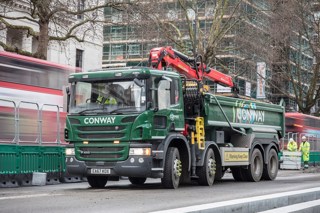Clean Air Zones (CAZs) are unfairly targeting hauliers and pricing trucks off the road, say a coalition of industry bodies.
The British Vehicle Rental and Leasing Association (BVRLA), Road Haulage Association (RHA), Freight Transport Association (FTA) and National Franchised Dealers Association (NFDA), claim that local authorities are rushing through air quality plans, with scant regard for the hauliers on whom their local economies depend. This is despite the haulage industry nearly halving its NOx emissions in four years.
BVRLA chief executive Gerry Keaney said: “The fleet industry can help Government to meet its air quality ambitions, but we need more support for HGV operators who face particular cost and operational challenges in upgrading their fleets.
“We rely on commercial vehicles accessing towns and cities for deliveries and any Clean Air Zone policy that deters trucks is likely to increase the usage of vans. 99% of our members’ LCV fleet is diesel so any initiative that increases the number of vans on our roads will not tackle pollution levels.
“Commercial operators need time and incentives to upgrade their fleets.”
The trade bodies this morning met with transport minister Jesse Norman and environment minister Therese Coffey, to discuss a joint six-point plan for air quality zones.
The plan – ‘The Way Forward’ – sets out recommendations these four trade bodies believe can help improve air quality whilst protecting haulage from punitive charges and bureaucracy.
It calls for consistent CAZ operating standards, smarter use of road space, and a phased approach supporting the transition to cleaner vehicles that doesn't put operators out of business.
RHA chief executive Richard Burnett said: “Ministers confirmed in our meeting that local authorities should consider all options and that charging should be a last resort.
“They also highlighted that it is up to local authorities to decide which vehicles would be charged, when charges should apply and the level of charge.
“If Clean Air Zones are not handled properly we will have more vans making deliveries, congestion will increase and so will pollution. Clean Air Zones will only reduce emissions if they target polluters proportionately.”
FTA chief executive David Wells added: “Placing all the burden on local areas to accelerate air quality improvements risks the livelihoods of many small business around the country.
"Government must help local authorities avoid the most damaging effects on the local businesses that use trucks or vans.”





















Edward Handley - 14/07/2018 11:43
We need some bold and forward thinking City determined to improve air quality to stop mucking about and to have the courage or their convictions and go ahead and impose an outright ban on all trucks within their CAZ. We can then watch what happens. Within days there will be chaos of course as shops run out of bread, milk, beer and the streets become clogged with thousands of 3.5 tonne delivery vans with one tonne payloads try to do the work of the small number of heavy trucks. After a month or so shops, pubs and restaurants will be closing and the press, who have spent the last 40 years moaning about juggernauts, will be screaming about the death of their City centre, and just maybe, the public will at last begin to understand that trucks are the key to our quality of life. Everything we buy, even on the internet, is carried by a truck at some stage of the journey to our homes, and virtually all those trucks are powered by diesel.